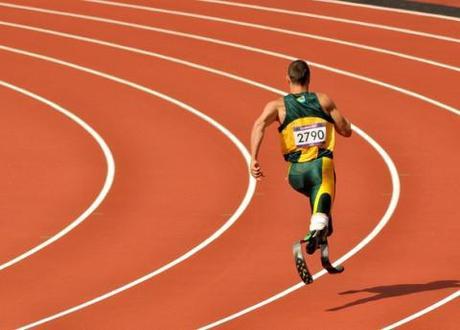 Oscar Pistorius: One of the many athletes who’ll be in the Paralympics. Photocredit: Will Clayton
Oscar Pistorius: One of the many athletes who’ll be in the Paralympics. Photocredit: Will Clayton
The background
The Olympics went down brilliantly; now it’s the turn of the Paralympics. Nearly 5,000 athletes will compete over 11 days, and the Brits have been given a target of over 100 medals. London’s Mayor, Boris Johnson, says the games could change people’s attitudes towards disability for ever. They do, however, come at a time when the Government is planning to cut disability allowances.
The Paralympic games were started by Dr Ludwig Guttman, who wanted to show injured D-Day veterans that they could still compete, at Stoke Mandeville hospital. Now athletes such as the equestrian Lee Pearson, who’s won 9 gold medals, or Ellie Simmonds, who won a gold medal at Beijing, will compete to show the world another side to disability – or ability.
Athletes are a source of hope
These games will “rekindle the popular euphoria” of the Olympics, said the Independent’s leading article; in fact, it may be “all the more inspiring” since the athletes “have surmounted so many difficulties.” However, Baroness Grey-Thompson, Britain’s “greatest Paralympian”, warns that this event might not have the desired effect – look at the “large funding gap” between Olympic and Paralympic athletes. Also, the Disability Living Allowance is being restricted; plus the Independent Living Fund is being ended. These Games, as Prince Harry said, “are about ability rather than disability.” “Paralympics” simply means “alongside” the Olympics; and so this competition is “held in parallel … and in the same spirit of friendship, solidarity and fair play.” These athletes “are a source of hope to the whole world.”
London’s great party not over yet
These athletes have had to endure “pain that was not willingly encountered before they even began their training regime,” said The Times’ editorial. Coping with disability is “a daily battle long before any athletic ambitions are entertained.” To train for these games is exceptionally determined; and this year there should be “proper recognition.” One of the legacies should be a tranformation of attitudes towards disability; but it shouldn’t be “the moment to rehearse the public policy debate surrounding disabled people.” You’d have to have “a heart of stone” not to “be moved by” these athletes. And also – “London’s great party is not yet over.”
Time to take off the blinkers and see the talent
This is the “first sell-out Paralympics,” said the Guardian, and it’s only “lack of interest among the world’s broadcasters” that still “betrays the distance still to travel.” Disability allowances, as Baroness Grey-Thompson has argued, should be seen as allowing people “to lead a productive and fulfilling life,” not as “a system of compensation for what they can’t do.” You can’t “mitigate” every impact of illness; but “the impossibility of doing everything should not be a barrier to doing as much as possible.” How about making “public transport work for everyone”? We should “take off the blinkers and see the talent.”
Cheer for them as for the Olympics
Sir Menzies Campbell, a former Olympic athlete, said on PoliticsHome that the Paralympics are “equally enthralling.” Much “sweat and effort” has gone into this, and we’ll “see bravery, commitment and achievement in abundance.” Campbell is going to cheer for the athletes “as loudly” as he did “for Usain Bolt and Greg Rutherford, and so should we all.”

